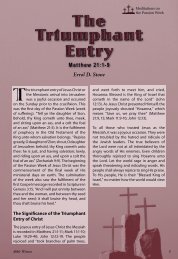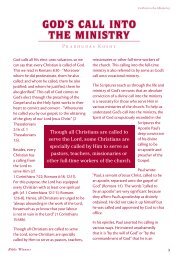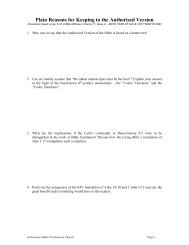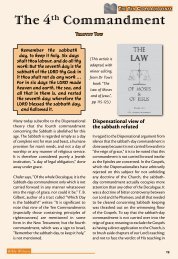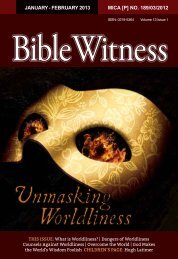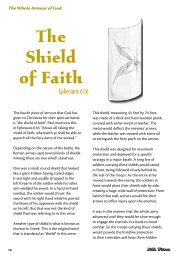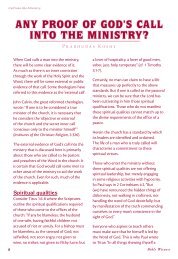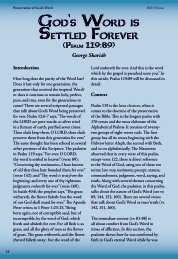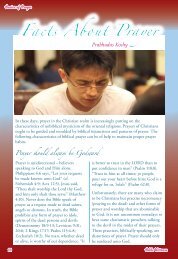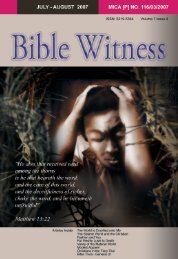Nurturing Of Children - Bible Witness
Nurturing Of Children - Bible Witness
Nurturing Of Children - Bible Witness
Create successful ePaper yourself
Turn your PDF publications into a flip-book with our unique Google optimized e-Paper software.
<strong>Bible</strong> <strong>Witness</strong><br />
During our daily family<br />
devotions, my children<br />
have asked me questions<br />
about the spiritual truths<br />
that I explained from our<br />
reading. I recall my eldest<br />
son, Cornelius, as a sevenyear-old,<br />
wondering about<br />
my teaching on God’s<br />
omnipresence: “You mean,<br />
when I am in school, God<br />
is with me there and also<br />
with mummy in the house<br />
and also with daddy in<br />
FEBC!” My answer to him<br />
was “Yes, you’re right.<br />
God can be everywhere<br />
at the same time. It is too<br />
amazing for daddy to<br />
explain how God can be<br />
everywhere. However, we<br />
know from the <strong>Bible</strong> that<br />
though we can’t take care<br />
of one another when we<br />
are at different places, our<br />
Lord is able to look aer<br />
us.” My son’s reply was,<br />
“O, So good! God can be<br />
with us though we are<br />
not together.” Such is the<br />
response of a child’s faith<br />
to a solemn truth that<br />
is difficult to explain.<br />
Even toddlers can be<br />
taught the truths in a<br />
simple manner. Again I<br />
recall teaching my then<br />
four-year-old, Andronicus,<br />
and two-and-a-half-yearold,<br />
Dorcas, the Gospel<br />
truths in simple question<br />
and answer form. When I<br />
ask them, “What did Jesus<br />
do to save us”, they are<br />
able to answer, “Jesus died<br />
on the cross for our sins.”<br />
God’s truth is for everyone,<br />
but we must make it<br />
applicable to children and<br />
their changing needs. We<br />
should also use the best<br />
methods for each age level.<br />
2. Avoid unexplained<br />
symbolism<br />
Oen adults mistakenly<br />
believe that an allegory<br />
or figure of speech<br />
will clarify some great<br />
truths. With children,<br />
if the symbolism is not<br />
properly explained, oen,<br />
it only obscures the truth.<br />
Most young children<br />
can grasp the truths<br />
sooner than they can<br />
understand the metaphor.<br />
Nothing is wrong with<br />
using symbolism or<br />
figurative language<br />
to illustrate truths to<br />
children. Many excellent<br />
children’s stories<br />
demonstrate how effective<br />
the use of allegory can<br />
be. But all the symbolism<br />
must be carefully<br />
explained. Younger<br />
children, especially,<br />
do not have the ability<br />
to interpret figurative<br />
language independently.<br />
3. Clearly separate<br />
reality from fantasy<br />
<strong>Children</strong> today are<br />
bombarded with fantasy<br />
and make-believe.<br />
Saturday-morning<br />
television, super-heroes,<br />
and fantasy toys have all<br />
reached unprecedented<br />
levels of popularity.<br />
<strong>Nurturing</strong> of <strong>Children</strong><br />
Even Sunday school<br />
materials contain huge<br />
doses of fantasy. Some of<br />
them include stories of<br />
personified forest animals<br />
and other imaginary<br />
creatures. There’s nothing<br />
necessarily wrong with<br />
that approach. Fantasy<br />
can be a legitimate<br />
and valuable tool for<br />
teaching children.<br />
But don’t neglect to draw<br />
the line clearly between<br />
what is reality and what<br />
is fantasy. For example,<br />
don’t let them think that<br />
the story of David and<br />
Goliath is like the tale<br />
about Ronald Raccoon.<br />
Make sure your kids<br />
know which story is<br />
make-believe and which<br />
one is actual history.<br />
4. Find out what your<br />
children are thinking<br />
concerning the lesson<br />
Debrief your kids aer<br />
your family devotion<br />
or Sunday school. It’s<br />
great fun, and you’ll<br />
find out exactly which<br />
truths they are learning<br />
and which ones are<br />
going over their heads.<br />
This will enable us to<br />
immediately correct<br />
them if they are wrong,<br />
or plan to teach them<br />
again at another time<br />
to make it clearer and<br />
understandable. It will<br />
also help us to affirm<br />
once again if they have<br />
understood the truth, and<br />
commend and encourage<br />
15




